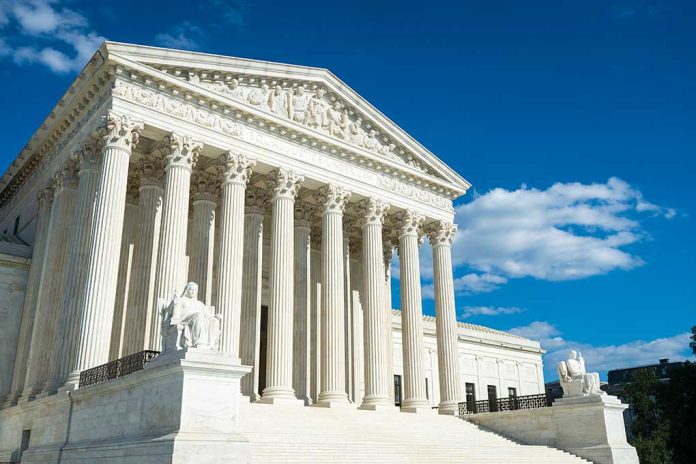
The Supreme Court just delivered a massive victory for military reservists working as federal employees, securing them millions in backpay that the government wrongfully withheld during their service to the nation.
Key Takeaways
- Federal employees serving as military reservists are now entitled to full differential pay when called to active duty during a national emergency.
- The Supreme Court ruled that reservists need only prove their service coincided with a declared national emergency, not that it was directly connected to that emergency.
- Thousands of current and former federal employees may be eligible for substantial backpay claims dating back years.
- The ruling strengthens veterans’ rights and overturns previous government practices that shortchanged reservists of their rightful compensation.
Supreme Court Victory for Military Reservists
In a landmark decision, the Supreme Court has ruled that federal employees who serve in military reserves are entitled to differential pay when called to active duty during national emergencies. This pivotal ruling in Feliciano v. Department of Transportation establishes that federal agencies must provide full civilian pay to employees serving in the reserves, ensuring they don’t lose income while fulfilling their military obligations. The Court explicitly rejected previous interpretations that required reservists to demonstrate a direct connection between their service and a specific emergency, instead ruling that temporal coincidence with any declared national emergency is sufficient to trigger payment rights.
The decision represents a significant shift in how federal agencies must compensate their employees who serve the country in dual capacities. For years, many reservists have been shortchanged, forced to choose between financial stability and military service. The Supreme Court has effectively put an end to this practice, affirming that those who serve our country shouldn’t face financial penalties for doing so. This ruling aligns perfectly with President Trump’s consistent advocacy for proper treatment of our military personnel and veterans, ensuring they receive the benefits and respect they’ve earned.
A recent Supreme Court ruling could lead to numerous pay claims for federal employees also serving as military reservists. https://t.co/NZNb34qgN1
— NEWSMAX (@NEWSMAX) June 18, 2025
Extensive Financial Implications
The financial impact of this ruling cannot be overstated. Thousands of federal employees who served in the reserves during national emergencies – which have been continuously declared since September 11, 2001 – may now be entitled to substantial backpay. The 2008 differential pay statute ensures that reservists receive the difference between their military pay and their civilian salary, often amounting to thousands of dollars per deployment. For many career civil servants who also served multiple reserve deployments, these claims could potentially reach tens of thousands of dollars in compensation that was wrongfully withheld.
“During a national emergency,” federal employees are entitled to this differential pay according to the ruling from the United States Supreme Court.
The Court’s decision also impacts the implementation of 5 U.S.C. § 6323(b), which entitles reserve military personnel called to active duty for a “contingency operation” to 22 days of compensated leave per year from their federal civilian employer. This provision had been improperly applied by many agencies, resulting in reservists being forced to use personal leave or take unpaid time off when they should have received paid military leave. Now, affected employees can file claims to have this leave restored or receive monetary compensation if they’ve since retired or separated from federal service.
Legal Precedents Strengthen Veterans’ Rights
The Supreme Court’s ruling builds upon several important legal precedents that have gradually expanded the rights of veteran federal employees. In O’Farrell v. Department of Defense, the Federal Circuit established a broad interpretation of what constitutes support for contingency operations, allowing for additional paid military leave. Similarly, the Butterbaugh v. Department of Justice case required agencies to compensate employees for improperly charged military leave prior to December 2000. These cases collectively represent a significant strengthening of protections for those who serve in both civilian and military capacities.
The Supreme Court clarified that federal employees are “entitled to differential pay if the reservist’s service temporally coincides with a declared national emergency without any showing that the service bears a substantive connection to a particular emergency.”
For government agencies, this ruling creates significant administrative and budgetary challenges. Federal departments must now adjust their payroll policies, process potentially thousands of claims, and allocate funds to cover these newly recognized obligations. This comes at a time when many agencies are already facing budget constraints, highlighting yet another instance where improper application of the law has created unnecessary financial burdens for taxpayers. Had these agencies simply followed the law correctly from the beginning, this substantial backpay liability could have been avoided entirely.
How Affected Reservists Can Take Action
Federal employees who served in the military reserves during national emergencies should act quickly to secure the compensation they’re owed. Several law firms, including Terrell Marshall Law Group and Tully Rinckey PLLC, are offering free consultations and representation with no up-front fees for affected individuals. Claims must be filed with the Merit Systems Protection Board (MSPB), and successful filings can result in either restored annual leave for current employees or lump-sum payments for those who have retired or separated from federal service. The clock is ticking on these claims, so prompt action is essential.
This Supreme Court ruling represents a significant win for military reservists who have long been shortchanged by federal agencies ignoring their legal obligations. It reinforces the principle that those who serve our country in uniform deserve fair treatment and full compensation, regardless of bureaucratic resistance. President Trump’s consistent support for our military personnel is reflected in this decision that ensures reservists finally receive the pay and benefits they’ve earned through their dual service to our nation. The ruling stands as a powerful reminder that even the federal government must follow the law when it comes to honoring its obligations to those who defend our freedoms.










